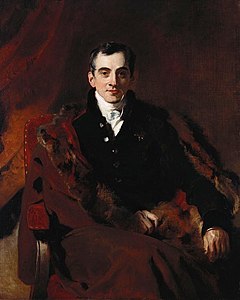Anton Gavel Yemelin
This article is incomplete because it is pending further input from participants, or it is a work-in-progress by one author. Please comment on this article's talk page to share your input, comments and questions. Note: To contribute to this article, you may need to seek help from the author(s) of this page. |
Anton Gavel Yemelin Антон Гавел Ємелін | |
|---|---|
 Portrait of Yemelin, painted by Dario Salino | |
| Minister-President of Soravia | |
| In office August 5, 1870 – September 16, 1892 Appointed by presidential prerogative: January 6, 1883 – September 16, 1892 | |
| President | Eduard Olsov |
| Preceded by | Konstantin Taranenko |
| Succeeded by | Yevhen Kucher |
| Member of the National Congress for Miersa | |
| In office July 13, 1861 – September 16, 1892 | |
| Minister of Justice and Courts | |
| In office July 13, 1861 – November 7, 1863 | |
| Preceded by | Tomas Lemovtsov |
| Succeeded by | Boleslav Lukov |
| Procurator of the Holy Synod | |
| In office November 7, 1863 – August 6, 1866 | |
| Preceded by | Igor Kanalin |
| Succeeded by | Simon Trusov |
| Minister of the Interior | |
| In office August 6, 1866 – August 5, 1870 | |
| Preceded by | Aulis Rantala |
| Succeeded by | Karl Yaremchuk |
| Personal details | |
| Born | November 17, 1827 Lomovsk, Kriklivets, Soravia |
| Died | April 11, 1901 (aged 73) Novokvasisk, Zalykia, Soravia |
| Resting place | Sambir Monastery, Krada |
| Citizenship | |
| Nationality | Miersan |
| Political party | Democratic–Liberal Party (LDC) |
| Other political affiliations | Non-partisan (1883–92) |
| Spouse | Agatha Meledina |
| Children | 2 |
| Alma mater | Lugin Campus, Luchintsy College |
| Signature |  |
Anton Gavel Alekseevych Yemelin (/'jɛmɛlɪn/; November 17, 1827 – April 11, 1901; aged 73), sometimes cited as Yémélin in Gaullican sources, was a Soravian statesman and politician who served in a myriad of administrative roles during the presidency of Eduard Olsov, but most notably as Minister-President of Soravia from 1870 to 1892. A key ally of Olsov, he spearheaded a number of decisive political victories for him, including the 1881 Soravian legislative election, which preceded the subsequent coup that expanded his powers greatly. Yemelin is still the longest serving Soravian head of government in history.
Yemelin was born in 1827 to Soravian-Miersan parents. He attended Luchintsy College for three years, leaving in 1848. He spent the years leading up to the First Soravian Civil War working in a number of local administrative roles. Aged 29, he moved westwards to Drisina, where he lived during the civil war. He was elected to the National Congress in Miersa in 1861, with his administrative and bureaucratic experience lending well to his reputation in the early congresses, many of whom were still filled by petty nobility. His expertise in law saw him appointed as Minister of the Justice and Courts from 1861 to 1863, before moving onto become procurator between 1863 and 1866 and Minister of the Interior from 1866 to 1870.
After Konstantin Taranenko stood down, Yemelin assumed leadership of the Liberal–Democratic Coalition, a liberal coalition of parties across the republic, respectively assuming office as Minister-President. Yemelin's popularity stemmed from the working class, who had become increasingly radicalised in the aftermath of the War of the Triple Alliance and the First Soravian Civil War. Yemelin and Olsov developed a close interpersonal relationship during this period, which culminated in Yemelin's resounding victory in the 1881 election and later the 1882 coup d'état. He continued as Minister-President until his retirement in 1892, appointed directly by the presidency during this time. He died in Zalykia in 1901.
Yemelin's political career is highly controversial. An enabler of the authoritarian policies that allowed Olsov to assume a dictatorial role, he is recognised as one of the foremost figures in the erosion of democracy in Soravia towards the end of the 19th-century. Considered a classical liberal by many, his supporters argue that he played a major role in Soravian economic growth in the same period, introducing liberal economic forms and acting as a bridge between supporters of laissez-faire and interventionist factions. Yemelin was also a leading figure in the development of anti-clericalism at the beginning of the republic, especially during his tenure as procurator, and his political thought contributed significantly to the later policies of Olsov shortly before his death.